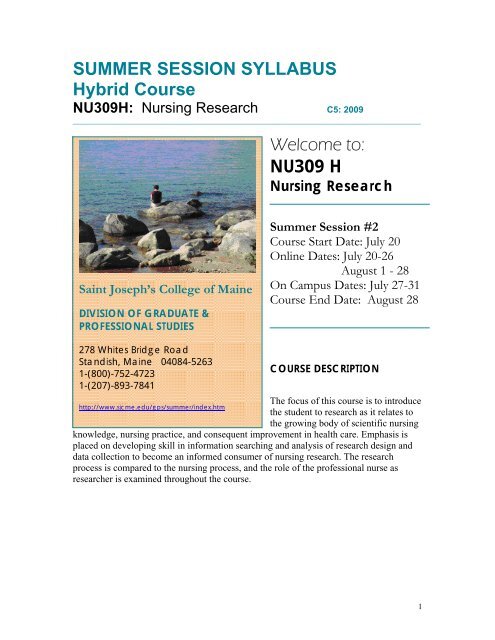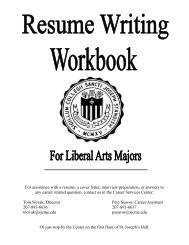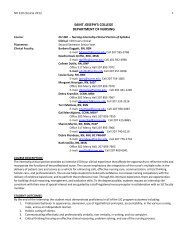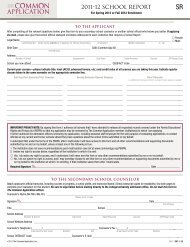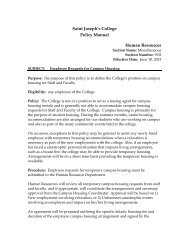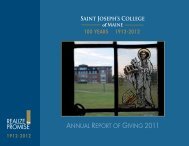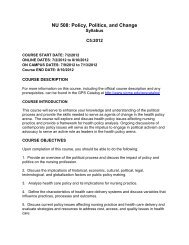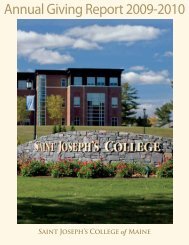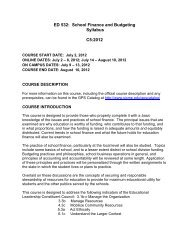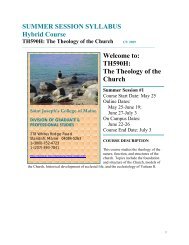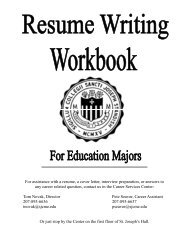SUMMER SESSION SYLLABUS Hybrid Course - Saint Joseph's ...
SUMMER SESSION SYLLABUS Hybrid Course - Saint Joseph's ...
SUMMER SESSION SYLLABUS Hybrid Course - Saint Joseph's ...
You also want an ePaper? Increase the reach of your titles
YUMPU automatically turns print PDFs into web optimized ePapers that Google loves.
REQUIRED TEXTLoBiondo-Wood, G., & Haber, J. (2006). Nursing research: Methods and criticalappraisal for evidence-based practice (6 th ed.). St Louis: Mosby ElsevierMelnyk, B. & Fineout-Overholt, E. (2005) Evidence-based practice in nursing andhealthcare: A guide to best practice. Philadelphia: Lippencott, Williams and Wilkins.Nursing research: Reading, using, and creating evidence. Sudbury, MA: Jones &Bartlett. Polit, D. F., & Hungler, B. P. (1993). Essentials of nursing research: Methods,appraisal, and utilization. (3rd ed.). Philadelphia: Lippincott.REQUIRED INTERNET SITES & INTERNET RESOURCESNational Institutes of Health (NIH) www.nih.govWorld Medical Association Declaration of Helsinkihttp://www.nihtraining.com/ohsrsite/guidelines/helsinki.htmlNational Institutes of Health (NIH) – Office of Human Subjects Researchhttp://ohsr.od.nih.gov/The Belmont Reporthttp://ohsr.od.nih.gov/guidelines/belmont.htmlNational Institutes of Health (NIH) – Office of Human Subjects Researchhttp://ohsr.od.nih.gov/Nuremberg Codehttp://ohsr.od.nih.gov/guidelines/nuremberg.htmlWRITTEN ASSIGNMENTSMany of the written assignments will be completed on during the week on campus. Aresearch question will be developed during that week, with time allotted to utilize thelibrary as a resource as the literature review is conducted. The course then converts backto an online format, which will require weekly written assignments on the readingmaterial, further developing the skills needed to become an informed consumer ofnursing research. The course culminates with the completion of a research critique ofboth a qualitative and a quantitative research article.3
RUBRIC FOR WRITING ASSIGNMENTSCorrectly identifies significant points 60%Follows directions 10%Well-written and correct grammar, sentence structure, etc. 10%Correct use of research terminology 10%APA format 10%4
Your Instructor______________________________________________________________________________________Name: Debra Riendeau MN,APRN, BC, PMHNP-BCEmail: driendeau@sjcme.eduPhone: (207) 893-7972Welcome to NU309 Nursing Research!I have been a registered nurse for over25 years. I worked primarily medical-surgicalnursing then transitioned into psych nursing. Ibegan as an associate degree prepared nurseand, as my children grew older, went back forboth my bachelor’s and master’s degree innursing. Just as many of you are doing, I wasraising a family as a single mother, workingfull-time and going to school full-time. My dayswere full with family, work, and school,studying and writing the never ending papers inAPA format.I have worked in medical-surgical units,emergency rooms, home health, long term careand was a Director of Nursing. I have worked in small rural facilities as well as largeteaching hospitals. Additionally, I earned my Advanced Practice in Psychiatry and am anAdult Psychiatric Mental Health Nurse Practitioner (PMHNP-BC). Currently, I teachfulltime in the on-campus nursing program here at <strong>Saint</strong> Joseph’s College of Maine andwork part time as a PMHNP-BC at a hospital in Lewiston, Maine. I teach mental healthnursing, community health nursing, research, leadership and other courses as the needarises. I am also involved in a current research process and primary investigator related tomy field of nursing.I am a cat and dog lover and share my home with my cat and dog. I like to hike,camp, kayak, and ski. I am also a Reiki Master Teacher and Practitioner.Well, enough about me. I look forward to meeting you on campus and continuingthat relationship on line and partnering with you in your learning experience as weexplore nursing care of the family, health promotion and integrating evidence-basedpractice in the this arena of nursing care.If you need to reach me, e-mail is the best way. You can reach me atdriendeau@sjcme.edu. My office phone number on campus is (207) 893-7972. I am inroom 317 in Mercy Hall on campus.When I’m not on campus with you, I will be working with you from home via theANGEL course site. See you soon in class!Debra5
<strong>Course</strong> Overview______________________________________________________________________________________COURSE INTRODUCTIONThis course is designed to present manybasic nursing research concepts to studentsas they are introduced to evidence-basednursing practice. Nursing research plays akey role in advancing the quality of nursingcare as evidenced by each of the courseunits. As a student, you will be assisting inadvancing nursing research activities bybecoming familiar with key research terms,historical implications, while understandingthe involvement of federal agencies, roleexpectations of the various stakeholders in the research process, and implications for furtherresearch studies. The goal of this course is to help the student become an informed consumerof nursing research.COURSE INFORMATIO NDuring the course, the student will be introduced to evidence-based nursing researchand many research terms that will be new to you. Note that research problems, hypotheses,and questions lay the foundation for a well-designed study as the topic of interest andwonderment becomes more focused and descriptive.As a student, you will learn to differentiate between research problems, questions,and hypotheses as you begin to understand and use research terminology that providesinsights into research processes. You will practice writing research problems and questions asyou begin to understand the role of correctly written statements within research studies thatyou are reading. The various types of hypotheses lend themselves to different ways of statingwhat researchers are trying to determine.You will note that as research progresses, carefully selecting articles to review andsamples or groups to represent a population of people becomes of utmost importance. Theliterature review provides the stimuli to formulate a better picture about gaps in what isalready known about a topic. Sampling techniques are crucial since it is neither desirable norfeasible to include entire groups of people, elements, events, behaviors, or other groups soonly manageable numbers of eligible candidates are invited to become participants as a resultof a chosen sampling method.You will focus on fine-tuning your skills as you examine validity, reliability, andtrustworthiness, and relevance of each study that you read. Key concepts are more evident toyou at this point in the course. Observations, interviews, text, film, and focus groups are mostcommonly used to collect qualitative data since this type of research focuses on observed,written, filmed, or taped interactions yielding thick, rich data.7
You will look at quantitative, qualitative, and mixed methodology as a way to acquirenew knowledge about nursing interventions. The ability to competently read research reportswill become more advanced as each section illuminates previous lessons and builds an indepthunderstanding of each one of these research designs.As you complete the readings and assignments, you will broaden your understandingof multiple ways to approach quantitative research designs using either true experimental,quasi-experimental, or non-experimental methods.The final lesson assignment provides the opportunity to demonstrate an advancedlevel of knowledge of nursing research processes as you critique a qualitative and aquantitative study. This preparation will assist you in asking “How can I institute evidencebasedpractice in my current professional nursing setting?”COURSE OBJECTIVESUpon completing this course, the student should be able to do the following:1. Demonstrate competence in the use of information technology by usingcomputers to access, retrieve, and disseminate nursing and other relatedresearch literature by using search engines and data bases.2. Develop the skills of an informed consumer of nursing research by utilizingthe steps of the research process in relationship to quantitative and qualitativeresearch applicable to clinical practice.3. Identify, analyze, and critique, at a beginning level, published quantitative andqualitative research studies applicable to clinical practice.4. Formulate clinical research questions related to clinical issues5. Conduct a literature search to find primary research reports, systematicreviews, meta-analyses, and clinical practice guidelines addressing clinicalissues.6. Utilize research as the basis for evidence based clinical decision making.7. Utilize research for the development of evidence-based policies, protocols,and standards.COURSE FORMATThis is a hybrid course in which there is a five week online component with one week inthe classroom. The online format provides the opportunity to continue the online dialoguein a group setting. You will acquire the skills outlined in the course objectives throughthe following:• Readings from the textbook and required readings, which may include case studies.• Lecture notes• Active dialogue and discussion in person with your instructor and classmates.• Active dialogue with your instructor and fellow learners via the coursebulletin board. Online discussion is a requirement for your course and is facilitated byyour instructor. The discussion will help you think more closely about the readings,8
elate them to your own experience, and keep up with current events in the subject.Here is how it works:Weekly Question: If your instructor is posting a new question each week in yourcourse, regardless of which lesson you are working on, check the discussion board eachweek for the current question. Your instructor will post the instructions there.• Class Participation: You are expected to participate in the online dialogue atminimum three times per week per discussion question, preferably on nonconsecutivedays.COURSE GUIDELINES• The first online assignment for this course will begin your exploration of thenursing research by reinforcing the importance of nursing research and evidencedbased nursing to registered nurses. The class room lecture and required readingswill provide a theoretical foundation for the study of nursing research, while theassociated assignments will assist the student to acquire the skills needed to performinternet searches of data bases, obtain research related to a topic of interest in theirnursing practice, and obtaining the skills needed to perform critiques of currentevidenced-based research. The active class participation, both on campus portion aswell as the subsequent online classroom discussions will enhance the learning ofeach student.• Learner participation in all aspects of the course is critical. All communicationswith faculty and peers are to be offered in a spirit of cooperation. It is anexpectation that all class participants are treated with dignity and respect.• According to the Department of Nursing policy, students must achieve a minimumof 73% to successfully complete the course.• Late work: grades on late assignments will be reduced by 5 points for each lateday including weekendsEVALUATION• Class Participation (on campus and online) .........................................................50%• Written Assignments ............................................................................................ 30%• Final qualitative and quantitative research critiques ............................................ 20%PLEASE NOTE: If life gets in the way of your online classroom responsibilities, youmust notify your instructor as soon as you aware that events may occur that may inhibityou from participating at the required level.9
Class Schedule________________________________________________________________________PERIOD TOPIC ASSIGNMENTWeek #1onlineResearch EthicsBelmont reportNuremburg codeDay 1 oncampusDay 2 oncampusDay 3 oncampusDay 4 oncampusDay 5 oncampusIntroduction to course, LibraryresourcesEvidence-Based PracticeClinical Practice GuidelinesWhat is critical thinking?What is a research article?The Research ProcessTypes of ResearchDeveloping a Research QuestionPICO formatCriteria for CritiquingVariablesTheory and ResearchInductive/Deductive reasoningConceptual and TheoreticalframeworksDesignsExperimentalQuasi-experimentalNon experimentalLiterature ReviewEvaluating Quantitative ResearchQualitative ResearchLoBiondo-Wood & HaberChapters 1 and 2M & F-O (ch 1,3)Critical Thinking WebsiteLoBiondo-Wood & HaberChapter 3M & F-O ( ch 2,3, 4)Identify a Clinical Issue andDevelop a Research QuestionLoBiondo-Wood & HaberChapter 5LoBiondo-Wood & HaberChapter 9, 10, 11LoBiondo-Wood & HaberChapter 18M & F-O (ch10)Quantitative ResearchArticle Critique (in class)LoBiondo-Wood & HaberChapter 6,7,8M & F-O (ch 6,11)Qualitative Research critique( inclass)Wrap up/prep for switch to online10
Week 2 onlineSamplingLoBiondo-Wood & HaberChapter 12 M & F-O (pp. 271-276)Week 3 onlineData CollectionReliability &ValidityData AnalysisAnalysis of Findings/ResultsChapter 14LoBiondo-Wood & HaberChapter 15 M & F-O (ch5)Week 4 onlineWeek 5 onlineDiscussionRecommendationsImplicationsPublicationChapter 16Chapter 1711
Final AssignmentThe Final Assignment is a written critique of two nursing research journal articles (onequalitative and one quantitative) using the criteria provided in the text to produce thisimportant summary of research processes. This final assignment provides you with evidencethat you can read, understand, analyze, and evaluate several research studies as a result ofyour heightened level of comprehension. The critique of two nursing research journal articlesallows you to compare ideal research studies with actual published research and todemonstrate your new ability to read, understand, and provide comments about what ispublished in current peer-reviewed nursing research journals. The final assignment enablesyou to demonstrate an understanding of basic concepts and terms used in qualitative andquantitative research. This critique of two research studies also encourages you to developthe ability to read, interpret, evaluate, and apply a variety of research reports found inindividual nursing practice arenas.12
The Online Learning EnvironmentOnline Discussion: What Is Expected ofYou1. Class participation using the coursediscussion board is an essential learningactivity and a required component of thiscourse.2. If life gets in the way of your course, thenyou must notify your instructor as soon aspossible. Your instructor is here to helpyou learn as much as you can; he/she needsto know what is happening in order to facilitate your learning.3. You are required to substantively contribute to the ongoing discussion. Substantivepostings are thoughtful and add value to the discussion by offering your critical andcreative thoughts and by building upon the thoughts and comments of others.4. All postings in response to discussion questions should be on point, concise, andsuccinct.5. The purpose of engaging in discussion is to extend your learning and to deepenyour understanding of concepts presented in the course. The expectation is not tohave everyone repeat what was read in the week’s readings but to share ideas,perspectives, experiences, and understanding; always trying to go beyond what we(currently) know.13
ANGEL Information________________________________________________________________________This course has an online ANGEL component. Please review the checklist below.Before your course begins you will receive a letter from the College with instructions onhow to access your account, which will include your log on and password.If you need technical support, please contact the 24-hour Collegis HelpDesk:1-(877) 725-4357 or email: https://hdo.collegis.comChecklist for Online LearnersIn order to complete this course, you will need the following:ANGEL account (will be assigned to you by <strong>Saint</strong> Joseph’s College)Basic computer skillsComputer with speakers or headphonesInternet accessRequired materials14


